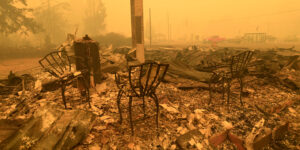Recent Florida Supreme Court decisions and ongoing abuse in Florida’s insurance market have led a ratings company to change the criteria it uses when rating insurers in the state. The announcement comes as insurers get ready to announce their 2016 annual reports that could indicate unfavorable results for many.
Ohio-based Demotech—which rates 397 companies nationwide, 57 of which are in Florida—said Monday that it has suspended ratings guidelines it uses in Florida due to what it is calling an uncertain operating environment in the state.
The ratings firm said no Florida insurers it rates are in danger of failing but there are about 10-15 that could see downgrades in March.
Demotech said it will eventually revise its general guidance but, in the meantime, it is advising carriers individually to ensure they are adequately capitalized to handle the now uncertain operating environment.
“Pricing insurance policies is a prospective process. Carriers and their actuaries price tomorrow’s policies based upon the claims and experience from yesterday and today,” the ratings agency said in a statement. “When changes occur in claims procedures, practices and protocols, the utility of historical experience is diminished. Similarly, with insurance policies issued for 12-month periods, court decisions that markedly change claims procedures, practices and protocols midterm are problematic to carriers, insurer rating agencies and actuaries.”
The uncertain operating climate that concerns Demotech refers to Florida’s escalating assignment of benefits crisis that has caused the number of litigated water loss claims to skyrocket over the past few years, particularly for the state-run insurer Citizens. The problem has begun affecting Florida’s private market insurers as well, with many pulling out of areas of the state where the abuse is the most rampant and filing for rate increases.
In addition, two court cases decided at the end of 2016 that Demotech said reversed “industry claims procedures that remain intact in other operating environments” will create unanticipated challenges for insurers that Demotech said it now needs to take into consideration to properly rate companies operating in Florida.
“Claims procedures, processes and protocols utilized in the past must be replicable in the future if loss experience is to be predictable and claims handling scalable,” Demotech said in a statement. “The [AOB) situation in Florida is unlike any other in the United States, and two recent court decisions, Johnson (September 2016) and Sebo (December 2016), have also revised claims procedures, practices and protocols from the industry standards that previously existed to a ‘Florida-only’ standard.”
The state high court’s ruling in December in the case of American Home Assurance Co. v. Sebo overturned a lower court’s decision that sided with the insurer. The case stemmed from a 2007 concurrent loss claim, where the Florida Supreme Court ruled for the homeowner in the case (Sebo). Lawyers specializing in insurance law said at the time that the case could lead to the reopening of past claims where coverage was denied.
In the other case, Johnson v. Omega Insurance Co., the Florida Supreme Court disagreed with a lower court’s ruling that Omega wasn’t responsible for paying the insured’s attorney fees because it didn’t act in bad faith when it wrongfully denied benefits for the insured and later paid the claim. The Supreme Court said that though the insurer righted the situation, it was at fault for initially denying the claim and therefore should be responsible for the insured’s attorney fees.
Demotech said “no carrier can be prepared for the impact of the Johnson and Sebo cases, which were less than 100 days apart, being superimposed on the challenges associated with an AOB protocol unlike that of any other jurisdiction.”
Demotech said it must now “undertake a review of its protocols to respond to the implicit albeit yet unquantified changes in the operating environment.”
Joseph Petrelli, president and CEO of Demotech, said the company has not yet determined what the new ratings guidelines will be, but it will be watching the Florida Legislature when it resumes in March and would certainly take any legislation that addresses these issues into account when establishing them.
“The operating environment in Florida is not the same as it was and is not the same as other jurisdictions, so we need to respond,” Petrelli said. “We are not 100 percent certain what the evolution will be; it is a fluid situation. However, we know the situation is not better today than it was several months ago, and we need to have a suspension of guidance while these situations play out.”
Petrelli emphasized, however, that the changes do not mean the ratings company will no longer rate Florida insurers; rather it is looking at each company individually and providing guidance on how each insurer can prepare financially for the impact that increased claims could have on its surplus.
“We are still rating companies and doing everything that we currently do,” he said. “But [Florida insurers] now operate in a jurisdiction where the situation has changed. We don’t want to operate with one hand behind our back, and too many things have changed for us to use the same ratings guidance.”
He said the companies Demotech rates currently have adequate reserves to handle losses from the catastrophe events of 2016, including Hurricanes Hermine and Matthew. However, those storms coupled with the changing market will have an impact on company balance sheets for 2016.
“[Catastrophes in 2016] eroded their surplus, and after that had been eroded there was the Johnson and Sebo cases,” he said. “No one is in danger of going under, but that being said we have standards that are higher than just not going under.”
Demotech is encouraging the insurers it rates that experienced significant losses from 2016 storms and any other unaccounted for losses to take advantage of the Statutory Statement of Accounting Principles Number 72, which provides insurers with the opportunity to address financial matters before Feb. 28. Insurers can use the SSAP to infuse capital into their surplus to improve their year-end results.
Petrelli said there are about 10-15 Florida companies that could see downgrades in March, but the company will not issue any downgrades before then.
“We will be doing downgrades and upgrades in March in response to year-end results—we have taken that position now. Even though we have a pretty good idea what those results will be, [insurers] have the ability to change those based on SSAP, so we are waiting for that to come out,” he said.
In addition, Demotech will be evaluating and implementing revised reinsurance evaluation procedures for all catastrophe-exposed property insurance carriers countrywide prior to the start of the 2017 storm season. The company said the revised reinsurance evaluation procedures will be more stringent than the procedures in the suspended guidance. Accordingly, they may be phased in over time.
Demotech will continue to provide all carriers in catastrophe-prone jurisdictions with “objective catastrophe reinsurance evaluation criteria and our initial thoughts on the review and analysis process of vertical and horizontal catastrophe reinsurance programs for the 2017 storm season in all jurisdictions,” the company’s statement said.





















 New Texas Law Requires Insurers Provide Reason for Declining or Canceling Policies
New Texas Law Requires Insurers Provide Reason for Declining or Canceling Policies  State Farm Mutual to Pay $5B Dividend to Auto Insurance Customers
State Farm Mutual to Pay $5B Dividend to Auto Insurance Customers  Beyond Automation: The Emerging Role for Contextual AI in Insurance
Beyond Automation: The Emerging Role for Contextual AI in Insurance  The Future of HR Is AI
The Future of HR Is AI 